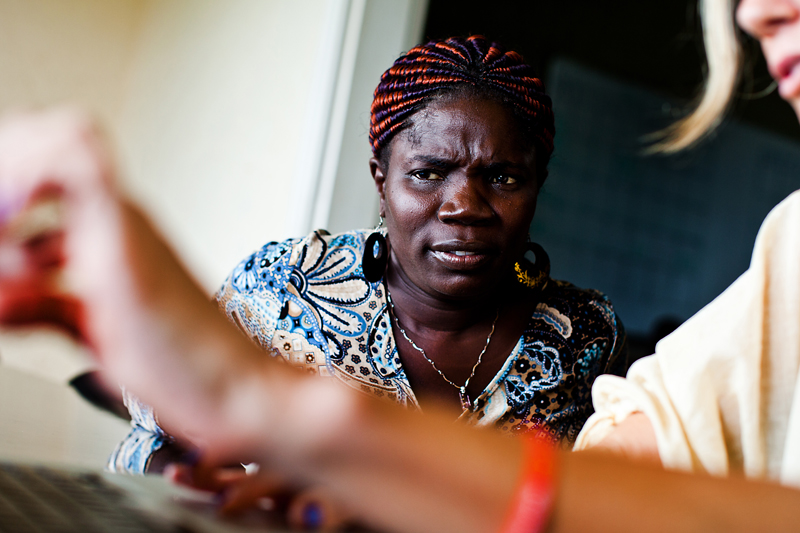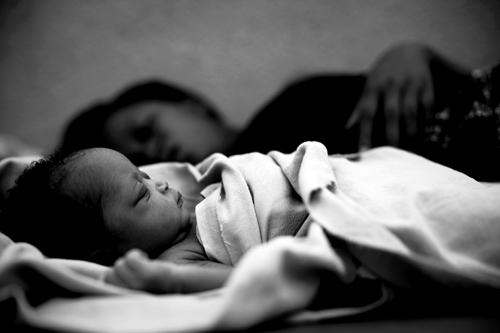
It's late afternoon in Todee, a village in rural Liberia, and the sun is starting to drop. Mae Azango settles into a taxi for the three-hour drive back to Monrovia, the capital.
But this long day hasn't been quite long enough. Ms. Azango, a journalist, needs to come back on Monday to finish reporting a story about midwives for her newspaper, Front Page Africa.
In the taxi, her phone rings. She's been ignoring it all morning – she's been working – but now she can answer. She listens quietly, and then she bursts into a belly laugh.
This is not a good sign.
Azango laughs all the time – but often not out of joy. She laughs out of disbelief, or disgust, or sheer frustration. For her, laughter is an indictment or a protest – a sign not that she feels carefree, but that something around her is terribly wrong.
The sudden guffaw in the back of the taxi, though, ends as quickly as it began.
"OK, OK, I hear you," she says. Then she hangs up, shaking her head. Her editor has been calling her all day, she explains, trying to tell her to get out of Todee. "The reaction to the story," she says, "is too much."
That story is her cover-page exposé of female circumcision, a traditional rite of the Sande. The Sande is Liberia's secret society for women, and 10 of the country's 16 tribes still use female circumcision to mark a girl's transition to adulthood – and her membership in the Sande.
Azango had gone undercover in Todee weeks before as part of her investigation into the ritual and its effects. She knew the story would cause controversy. Even though Liberians all know about the practice, often referring to it as "cutting," members of the Sande swear an oath to never speak about the society at all, and no one else talks publicly about cutting.
Or hadn't, until Azango's story.
"People are saying we have exposed a secret, a women's secret, blah, blah, blah," Azango says. She had known there would be controversy. "I expected to get a tongue-lashing," she insists. But her editor had told her it was worse than anyone thought.
"You better move from Todee," she had told Azango, "because those people will grab you and put you in the Sande bush."
Azango and her editor understood what that would mean: They wanted to circumcise Azango. It would be a punishment for violating the taboo, and it would be an assurance that she'd never write about the topic again. Anyone who breaks the oath and tells others what happens in the bush is killed.
This wasn't your average reader's complaint. This was a death threat.
But Azango was supposed to come back to this village – the same place her editor says she's no longer safe – on Monday to finish the story.
"What will you do?" she was asked.
She laughed louder than she'd laughed all day.
The story was meant to provoke. After all, that's what Front Page Africa does. As Liberia's leading investigative daily, the paper publishes 1,500 copies a day, all printed overnight on an old-fashioned press, each copy folded by hand. But its audience is much wider: The newspaper usually sells out within hours, and as with a single copy of any of Monrovia's many daily papers it might pass through a half-dozen hands.
That's especially true when Front Page Africa tackles hot topics. Last year, Azango reported on an alleged rape by a Liberian national police officer. He went free for three months, even after the allegations were made – until Azango's story ran. The paper also published investigations into corruption, teenage prostitution, and other explosive issues.
The editor and publisher, Rodney Sieh, says Azango plays an important role in these efforts. "She knows how to get things done. She knows how to tell a story; she knows people," he says. "She knows how to interview people … an asset that most people here don't have."
Whatever her natural talent, Azango says it's the role of human rights journalism in Liberian society that attracts her, despite the risks.
"You're the watchdog," she says. "When you see [an injustice], you talk. That's your duty. That's what I know to do."
It was not, however, an easy thing to be able to do. Liberia's 10-year civil war erased everything normal about life here. Azango, who was a pregnant teen when rebels took control of her village, nearly died during a difficult birth, complicated further by an incompetent midwife.
"But I didn't die," she says with calm resolve. "Maybe God kept me for a purpose. And I think the reason God kept me alive is to do what I'm doing … to write about these things."
Azango felt her delivery difficulties were a human rights violation, something she became determined to stop. Such drive is what distinguishes Azango from other journalists in Liberia, says Prue Clarke, executive director of New Narratives, a media development organization that supports independent journalism in Liberia. Azango joined Ms. Clarke's organization as a fellow two years ago.
"It's all instinctual," Clarke says of Azango's talent. "She understands, 'This is an injustice; this is important. I have to expose this.' "
Last year, Azango turned her attention to female circumcision. The practice is considered sacred by many peoples around the world – and a human rights violation by others, including Western advocacy groups and the United Nations, which has been pressuring countries to ban female circumcision since 1997.
Several women Azango spoke to talked about the difficulties they faced in adulthood because they'd been subjected to cutting as children. Azango decided that even if the practice is accepted by traditional leaders, "It's a violation of [a girl's] rights…. If you grab her [and cut her], just as you grab her and rape her, it is a crime."
She published her first piece about cutting last winter. It didn't please Sande women, and Azango says several tried to discourage her from pursuing any further stories.
For journalists in Liberia, intimidation is a familiar weapon.
"The government has a combative approach to journalists," Clarke says. "It feels like it can bully them and they'll go away."
Front Page Africa has a record of standing up to such intimidation – its editor and publisher is currently facing contempt charges for reporting on alleged theft of international aid by members of the Supreme Court – and Azango, too, felt the need to stand firm. So she published her second piece in March, on International Women's Day.
That in itself was a provocation in a country led by Africa's first female president, Ellen Johnson Sirleaf. "Everybody is talking about the good things women have done," Azango says. "What are you celebrating, when this [cutting] is still happening in Liberia?"
The piece caused a firestorm. Several women – including one living in Azango's home – allegedly threatened Azango's life. The police are still investigating the reported threats, but Azango spent a month in hiding, avoiding her office and changing the place where she slept every few nights. And she published a third story, about informal schools in the Sande's rural bushlands.
Even in the days of greatest personal risk, Azango says, she didn't regret writing the story. Other outlets also reported on it, and at the end of March, the risks paid off: The government announced that it was banning all the secret society's activities, including cutting.
Clarke, among others, says Azango's story spurred the announcement, giving the government the kind of political cover necessary to make such a sweeping change.
For Azango, though, it reinforced her favorite part of human rights journalism. "It's not my cause alone.... I'm fighting to redeem the next generation," she says of her work. "But Mae alone cannot do it. I need everybody."






